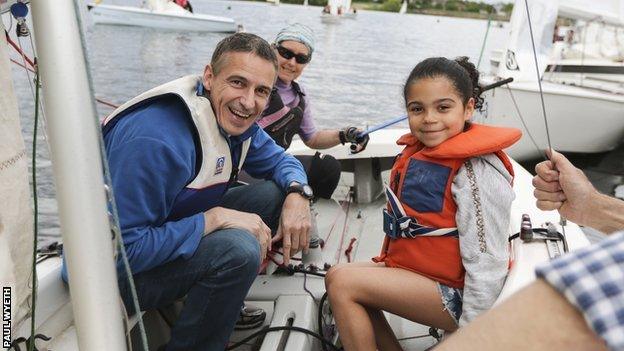How did Sir Ben Ainslie help inspire America's Cup win?
- Published
Team USA's shock America's Cup win
It has been described as the greatest comeback, a moment in sailing history when Oracle Team USA fought back from the brink to beat Team New Zealand by 44 seconds in a winner-takes-all finale.
The Americans had been trailing 8-1. Their challengers were on match point. The turnaround was dramatic. It was unexpected. And it happened once Britain's greatest sailor, Sir Ben Ainslie, came onboard.
But what role did the four-time Olympic gold medallist play in Oracle's gripping 9-8 triumph in San Francisco and how influential was the Briton?
John Derbyshire, racing manager and performance director of the Royal Yachting Association, and Sir Robin Knox-Johnston, the first man to perform a single-handed non-stop circumnavigation of the globe, explain how the 36-year-old helped Oracle to a remarkable victory.
Ainslie the master tactician
The America's Cup is said to be like a game of chess and Ainslie was the Garry Kasparov of the Oracle team, the grandmaster charged with planning the crowning moves.
"The tactician is one of the three key roles on these bigger boats," Derbyshire tells BBC Sport.
"Ainslie determines how to respond to another team's move. For example, if one boat turns away from the wind, he will have to decide when to do the same.
"The tactician is responsible for the boat-on-boat manoeuvres and it's quite a leadership role.
"He has to think about what the opposition might do and will need the strategist to inform him where the wind is coming from and ensure the helmsman is able to steer as fast as possible, and the rest of the crew need to know what is going on, too."
The British knight's 'intangible chemistry'
Oracle had lost eight of their first 11 races. Larry Ellison's men were under attack on home waters and, in Ainslie's words, had a "mountain to climb". But, then, the team gambled.
In a last throw of the dice, Oracle drafted in Ainslie to replace John Kostecki, a San Francisco native, and although the Briton's impact was not immediate - Oracle lost their first two races with the greatest Olympic sailor calling the shots - he soon helped reduce the deficit and, 10 victories later, it was checkmate to Ainslie.
"The Americans were beaten until Ben joined the boat," says Sir Knox-Johnston.
"Ben may be risking his life if he visits New Zealand, but there's no question it was Ben's arrival which changed the chemistry completely."
It certainly seems Ainslie has an alchemist's touch, combining superbly with skipper James Spithill and strategist Tom Slingsby.
"He clearly has something that makes a difference and it's that intangible chemistry which seemed to improve the performance of the boat," says Derbyshire.
"Ben seemed to make every call correctly and it all added up to a fantastic team performance."
The team behind the superstar sailor
If the competition's tactics can resemble a game of chess, then the sheer volume of personnel required to ensure the team's sailors are well-equipped on the water draws comparisons with Formula 1.
Oracle had a 203-strong team, each member with a specific task, each with a part to play in the hi-tech multi-million pound programme.
Sir Ben Ainslie on America's Cup win
"There will be the specialists like the meteorologists, the sail makers," reveals Derbyshire. "There are designers and engineers who are from the sailing world but with perhaps aeronautical background, because they're using solid wing masts rather than soft sails which we've previously seen.
"There's also a large shore team that rigs the boat because getting these masts in and out of the boat requires a crane. Everything is duplicated, pretty much like Formula 1.
"On the boat each team is slightly different, but a boat is usually split into two halves. There's the afterguard which includes the helmsman who steers, a strategist and the tactician.
"On the other side, people will have a variety of roles, from hoisting and lowering the sails to generating hydraulic power to power the movement of the sails on the wings."
The charismatic Ainslie could lead a British team
Ainslie is the first Briton in 110 years to be on board a winning America's Cup boat and the decorated sailor has now set his sights on winning a competition which was first staged off the Isle of Wight in 1851 with a British team.
Wealthy businessman Sir Keith Mills was the last Briton to attempt to bring the Auld Mug back to these islands, establishing Team Origin in 2010 but he pulled the plug a year later once he learnt of Oracle's plans to use catamarans for the 34th Cup.
Ainslie says Britain has the talent, while both Derbyshire and Knox-Johnston believe the Olympian has the charisma to help fulfil his ambition.
"We could probably produce three or four teams because we're so strong in sailing," says Knox-Johnston.
"It's just a question of getting behind Ben because if anyone can, he can."
'Big boys with big toys'
Anyone hoping to form an America's Cup team needs cash, oodles of it - about $100m (£62.5m) if Oracle are to be the guide.
A large crew, the world's best sailors and high-performance catamarans do not come cheaply, just ask the man bankrolling Oracle, the software billionaire Ellison.
So desperate were New Zealand to take the prestigious trophy to the Antipodes, the country's government splashed out about $30m (£19m) in subsidies in the hope the next contest would be held on their shores.
But is it realistic to think a British team could raise such funds?
"If you can show people that it's good for them and the country, it would be possible," says Knox-Johnston.
"It won't be easy but with someone like Ben leading it, we've got a chance."
Derbyshire is equally as optimistic. "It's more realistic now given that the economic climate is slowly improving," he says.
"One of the appeals of the America's Cup is that it's big boys with boy toys. It's rich men putting a lot of their finances behind it.
"Their finances, combined with the potential economic benefits to a local area or country, will generate funding. Perhaps we're getting closer to that than we've been for some time."
- Published26 September 2013
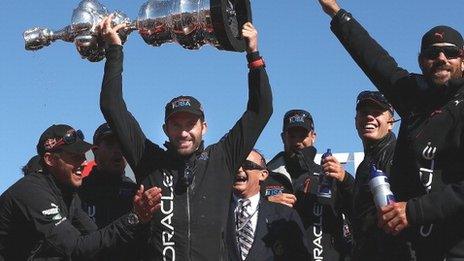
- Published25 September 2013
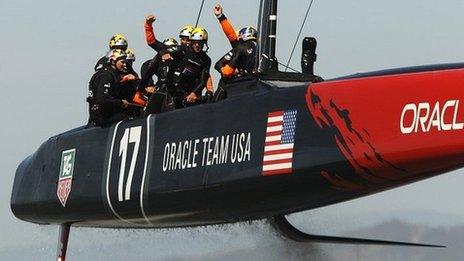
- Published12 May 2013
- Published25 September 2013
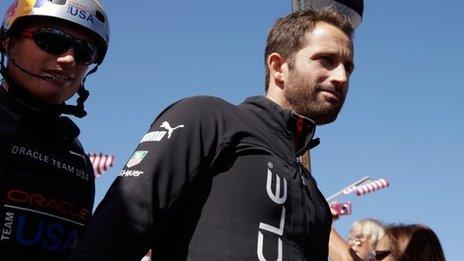
- Published23 September 2013
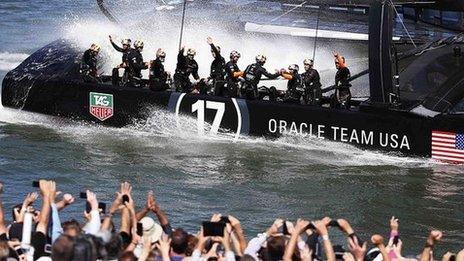
- Published22 September 2013
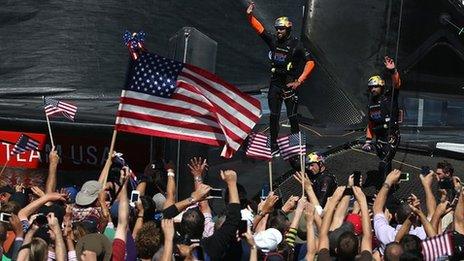
- Published21 September 2013
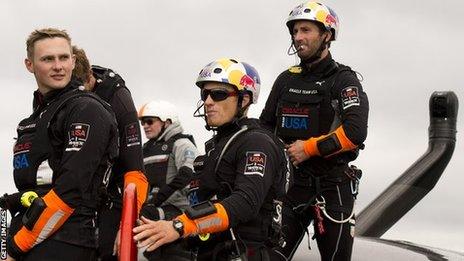
- Published20 September 2013
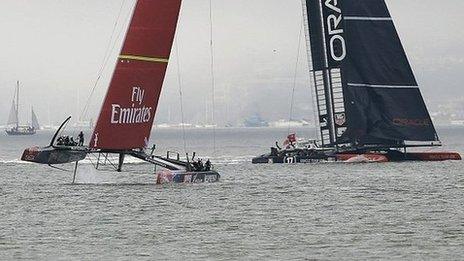
- Published19 September 2013
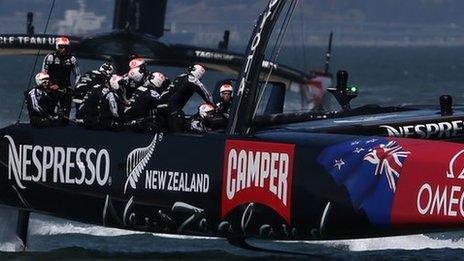
- Published18 September 2013
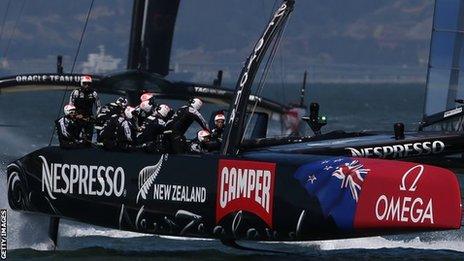
- Published15 September 2013
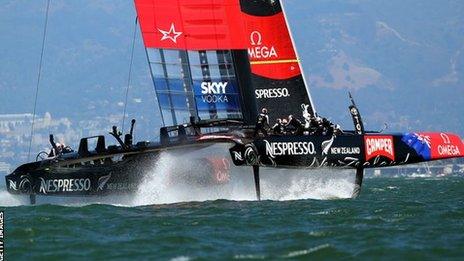
- Published1 May 2018
